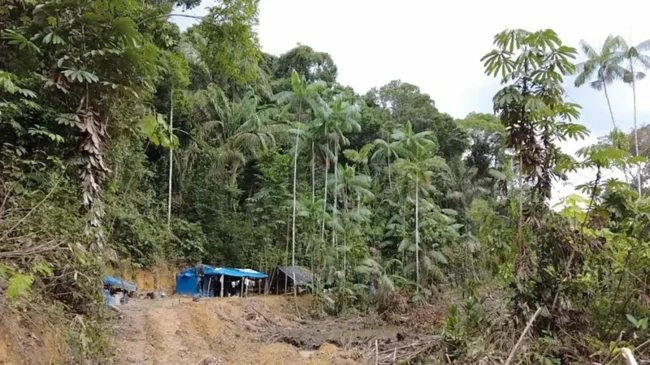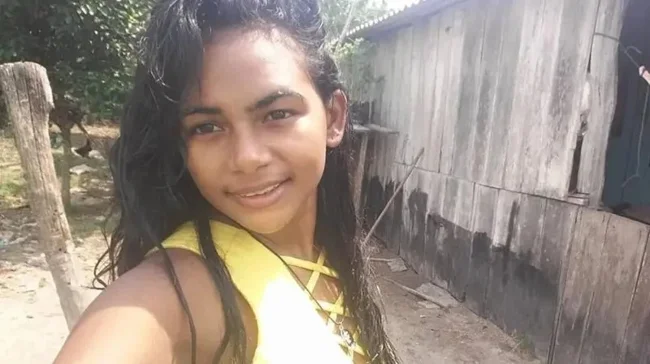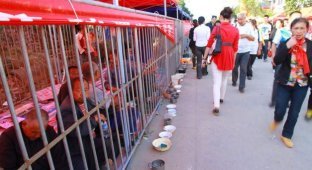Sex for gold: how women live in illegal Amazon mines (4 photos)
Dayane Leite never intended to become a sex worker, but when she was 17, her husband died of a heart attack and she couldn't afford the funeral. 
Her hometown, Itaituba, in the northern Brazilian state of Pará, is in the heart of an illegal gold mining area, so a friend suggested she make money by having sex with miners deep in the Amazon.
"Going to the mines is like playing dice," she says. "The women there are humiliated. They can get punched in the face and yelled at. I was sleeping in my bedroom and one guy jumped through the window and put a gun to my head. And if they pay, they want to own the women."
Dayana managed to raise money for the funeral and gave birth to her first child at 18. For the past 16 years, like many women in Itaituba, she has periodically returned to the mines to work as a cook, laundress, barmaid and sex worker.
Now she has a family of seven to support.
"I don't want to say that all the women in town do this, but some of them do. So it's kind of normal. We don't really care," says Natalia Cavalcante, who became a sex worker in the remote mining town at 24. Four years later, after marrying a bar owner, she became a brothel owner, a job she only recently quit to look after her nieces in town.
Life in the mining camps in the rainforest is harsh. Most of these camps are just a dirt road, a bar and a church. The miners themselves live further afield, in huts made of wood and canvas, with snakes and jaguars, and in total darkness once the generator goes out. Women who work as cooks are forced to live in these camps with the men.
Miners come to the village when they find gold and have money, Natalia adds. The women say they sometimes have to be persuaded to shower before sex.
Running a brothel is illegal under Brazilian law, but Natalia says she took no commission, simply hiring bar staff and renting out rooms.
Young women would approach her asking for work, and she would sometimes lend them money for the seven-hour drive from Itaituba.
Asked if she had any qualms about recruiting other women, she said, “Sometimes I think, ‘I’ve been through this, and I know it’s not that nice.’ But then I think, ‘A girl has a family, sometimes a child to raise.’ Many of the girls have one or two children. So we accept it.” 
Even before she got married, Natalia had earned a lot of money.
Now she has her own house in Itaituba, a motorcycle and a considerable amount of gold, which she sometimes received as payment for sex, two or three grams at a time. She plans to study, to become a lawyer or an architect.
According to her, some women in Itaituba, nicknamed the City of Gold Nuggets, have started their own businesses with the money they earn.
But for women, it is a big risk to go to the mining towns where violence and lawlessness reign.
The environmental damage caused by the mines is well known. But the human cost – which includes violence, sexual exploitation and human trafficking, according to the UN – is largely unreported.
One precious metals trader told the BBC that illegal gold from these mines is usually labelled as the product of a licensed mining cooperative, then exported and turned into jewellery, mobile phone components and other electronics.
The three biggest buyers of Brazilian gold are Canada, Switzerland and the UK. According to the Instituto Escolhas think tank, more than 90% of all exports to Europe come from areas where illegal mining takes place. 
Murderings of women in mining communities are not uncommon. The body of 26-year-old Rayele Santos was found last year in the room where she lived near the Kuyu Kuyu gold mine, an 11-hour drive from Itaituba.
Her older sister, Railane, says a man offered Rayele money for sex, she refused, and then he found her and beat her to death.
"A lot of women die every day, a lot," Railane says. “I was born in the mines, I grew up in the mines, and now I’m afraid to live in the mines.”
One man has been arrested in connection with Raile's murder, but has not yet been tried. He denies all charges.
The size of Brazil's illegal gold mines has more than doubled between 2013 and 2023, to 220,000 hectares. No one knows how many women and illegal miners are working there. The Brazilian government says there may be between 80,000 and 800,000 illegal miners.
Under President Luiz Inacio Lula da Silva, the government has taken steps to close illegal mines and stop dealers from buying up the gold, but high gold prices still drive many men to try their luck.
Dayane wants to stop working in the mining areas because of the risks and harsh conditions she lives in, but she is planning what she hopes will be her last trip. Her goal is to earn enough money in two to three months to open a snack bar when she returns, although she knows that may not work out.
She says that whenever she is alone and walking in the forest, she worries about her children.
"I will continue as long as I have the strength," she says. "Because I think one day my children will say, 'My mother worked so hard. She went through all this for us and she never gave up.'" 





























